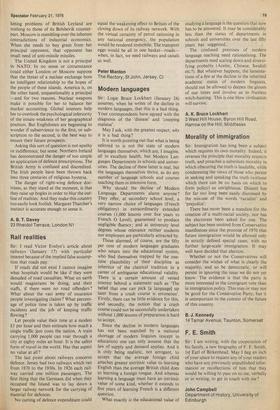Modern languages
Sir: Logie Bruce Lockhart (January 24) assumes, when he writes of the decline in modern languages, that this is a bad thing. Your correspondents have agreed with the diagnosis of the 'disease' and 'creeping malaise'.
May I ask, with the greatest respect, why it is a bad thing ?
It is worth pointing out that what is being referred to is not the state of modern languages themselves, which are, I imagine, all in excellent health, but Modern Languages Departments in schools and universities. The decline of these latter is real, but the languages themselves thrive, as do any number of language schools and courses teaching them in intensive form.
Why should the decline of Modern Language Departments alarm anyone? They offer, at secondary school level, a very narrow choice of languages (French obligatory) in extraordinarily extended courses (1,000 lessons over five years to French 0 Level), guaranteed to produce negligible fluency; and at university level degrees whose relevance neither students nor employers are particularly attracted by.
Those alarmed, of course, are the fifty per cent of modern languages graduates who return into the educational system, who find themselves trapped by the onetime plausibility of their discipline as inheritor of the classical tradition in a career of ambiguous educational validity. There is a certain amount of vested interest behind a statement such as 'The belief that one can pick [a language] up later from a crash course is erroneous'. Firstly, there can be little evidence for this, and secondly, the notion that a crash course could not be successfully undertaken without 1,000 lessons of preparation is hard to accept.
Since the decline in modern languages has not been matched by a national shortage of modern linguists (except in education) one can only assume that the law of supply and demand applies. And it is only being realistic, not arrogant, to accept that the average foreign child attaches greater extrinsic value to learning English than the average British child does to learning a foreign tongue. And whereas learning a language must have an intrinsic value of some kind, whether it extends to five years of learning French is a different question.
What exactly is the educational value of studying a language is the question that now has to be answered. It may be considerably less than the status of departments in schools and universities over the last fifty years has suggested.
The confused premises of modern language teaching need rationalising. The departments need scaling down and diversifying probably (Arabic, Chinese, Swahili etc?). But whatever happens, the lamentations of a few at the decline in the inherited academic status of modern linguists, should not be allowed to deepen the gloom of our times and involve us in fruitless witch-hunting. This is one blow civilisation will survive.
A. K. Bruce Lockhart 3 West Hill House, Byron Hill Road Harrow on the Hill, Middlesex


































 Previous page
Previous page